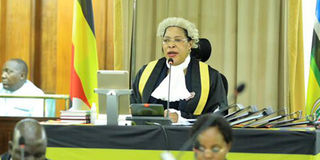Go beyond House budget to cut costs

Speaker of Parliament Anita Among presides over plenary recently. PHOTO/ FILE
What you need to know:
The issue:
Public expenditure
Our view:
The government needs a comprehensive review of all its sectors with the aim of trimming public expenditure in whole.
The move by the Ministry of Finance to trim Parliament’s budget by half received an expectedly angry response from the latter.
Speaker Anita Among and the Members of Parliament see this as an attack on the institution that is meant to provide oversight over the Executive.
It is also equated to usurping the powers of Parliament in appropriating public funds in the interest of the greater good.
These may not be necessarily the issues associated with the brewing fight between the August House and the ministry charged with collecting and dispensing money.
Beyond the debate on the floor, MPs are mini-governments in their constituencies who are expected to deal with the basic needs of the people.
Every MP must contribute to school fees, medical bills, burial expenses, road rehabilitation, sports causes, church and mosque constructions et al.
These have created a bottomless pit for which MPs need money more than vultures will ever need meat.
It is largely down to the absence of government in providing basic social services.
The populace has nowhere to turn except to those they have elevated through the ballot.
However, the voters who are the main beneficiaries of these gestures are not as appreciative of the resources their 529 MPs commit to their counties.
Voters always want more and yet it is not shocking that if the move to trim the parliamentary allocation was to be subjected to a public vote, most of us would back it. The ministry would win the vote by a landslide.
We have become more and more aware of Uganda’s bloated bill for public expenditure.
And Parliament is only part of the many cost centres whose bill has shot up astronomically over the recent past.
The government needs a comprehensive review of all its sectors with the aim of trimming public expenditure in whole. Not even the ongoing review of government departments and agencies is far-reaching enough to solve the problems of resource wastage.
Look across this government and you will see duplication of offices and programmes.
Today, even the most basic leader wants to become an MP because then they have fair access to public resources to enrich themselves, families and communities.
If the government is to achieve its economic objectives and extend the sphere of private choice, then public expenditure must be cut. In the immediate term, the impact would help reduce annual borrowing and help reduce the total public sector debt.




